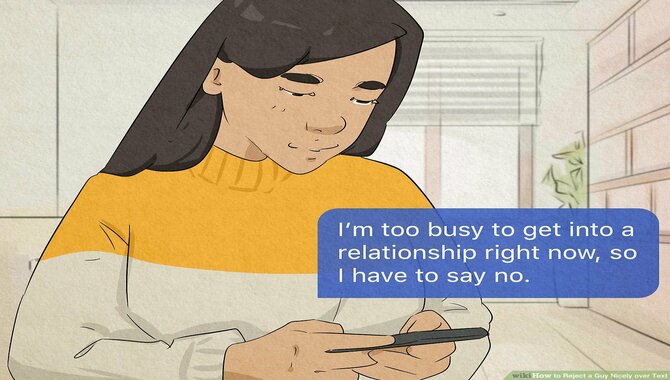If you’re looking for a way to improve your relationship, you’re in luck. This blog provides a step-by-step guide on how to renew dialogue in your relationship.
It covers topics like how to respond to rejected dialogues, guidelines for renewal dialogue, and the importance of dialogue. By following the tips provided, you’ll be able to strengthen your relationship and achieve long-term success. So read on and start renewing the dialogue today.

8 Tips For Renewing Dialogue In Your Relationship

When restoring dialogue in a relationship, start by discussing what you’re both interested in. Avoid making assumptions and listening more than talking. Try focusing on your partner’s feelings, not just the facts of the situation. However, following these 8 simple tips, you can start off on the right foot and work toward a stronger and more meaningful relationship.
1. Be Aware Of Your Dialogues And How They Impact The Relationship.

If you’re actively paying attention to how your conversations impact the relationship, it’ll be easier to bring about renewal dialogue. Make sure each conversation is important and helps strengthen the couple’s bond.
2. Respond With Honesty And Sincerity When Rejected Dialogues Happen.
When someone rejects a conversation, don’t take it personally! It’s usually an indication that their feelings haven’t changed, so continue talking constructively until they have been expressed fully (see #8 below ).
3. Don’t Hold Back When Discussing Difficult Topics.

If there are topics that you’re afraid to bring up, it’ll be hard to have a constructive dialogue about them. Be brave and open up about your concerns – this will help the conversation move forward healthily.
4. Begin By Stating Your Opinion Honestly.
Then Listen Carefully To What The Other Person Says- Don’t Argue Right Away. When you state your opinion, ensure that you’re listening attentively so that the other person knows they are being heard respectfully. If their response doesn’t align with your opinion, try to empathize and understand their perspective.
5. Avoid Getting Defensive When Dialogue Doesn’t Go How You Want It To.

When you get defensive instead of listening, it’ll be hard for the other person to continue talking constructively. Instead, take a deep breath and patiently wait for them to explain themselves fully (see #8 below ).
6. Don’t Take Anything Personally.
Even if something is said bluntly or unkindly, don’t take it personally. This isn’t about attacking or insulting the other person. It’s simply about communicating what they’ve said in a way you can understand.
7. Be Prepared To Listen Attentively For Extended Periods.

When someone is trying to communicate their thoughts and feelings, they may be unable to do so quickly. This is why you must be willing to listen carefully- even if the conversation drags on for hours.
8. Express Your Gratitude When The Dialogue Goes Well
Dialogues don’t always go as planned – which means that sometimes things work out perfectly, and other times there are hiccups. Regardless of the outcome, always express gratitude to the other person for trying their best. This will help them feel appreciated and encourage further dialogue in the future!
How To Respond Appropriately To Rejected Dialogues

When someone rejects your dialogue, it can feel pretty frustrating. But don’t worry; there are ways to respond effectively so the dialogues can continue. When dialogue doesn’t go the way that you want it to, there are a few things that you can do to respond effectively.
- Avoid getting defensive or argumentative- this will only make the other person stop talking altogether and may lead to further conflict. Instead, take a deep breath and patiently wait for them to explain themselves fully (see #6 below ).
- Don’t take anything personally. Even if something is said bluntly or unkindly, don’t take it personally. This isn’t about attacking or insulting the other person. It’s simply about communicating what they’ve said in a way you can understand.
- Be honest- if something was said that made you feel uncomfortable or offended, be upfront and let the other person know. This will help them to correct any wrongs and build trust again.
- Seek out mediation or counseling- this type of professional help can be beneficial for resolving complex issues such as rejection dialogue problems in relationships. Unfortunately, not everyone is equipped to handle these types of situations on their own (and sometimes, it’s difficult to tell when it’s time for outside counsel ).
- Remember- the relationship isn’t over just because the dialogue didn’t go how you wanted it to. Remember your positive interactions with the other person, and focus on working together towards future goals rather than Dwelling on The Past.
Guidelines For Renewal Dialogue

Relationships are a precious commodity, and it’s important to take care of them by maintaining healthy dialogue. Here are some guidelines for renewal dialogue that can help: First, agree on what you want to discuss. This will help reduce the tension and open up communication. Second, choose a time when you are relaxed, comfortable, and free from distractions.
Third, ensure your dialogue is respectful and collaborative – it should aim to achieve common goals. Fourth, be prepared for confrontation and be willing to escalate if necessary to avoid breaking the relationship down further. Finally, remember that dialogue is a two-way street – be willing to listen to your partner and be open to hearing their side of the story. Following these simple guidelines can keep your relationship healthy and thriving.
The Importance Of Dialogue
Dialogue is one of the most important things in a healthy relationship. It allows both partners to share their thoughts and feelings and find common ground so they can build a better future together. Dialogue is critical to any healthy relationship. It’s the engine that drives progress and understanding and is the key to resolving conflicts.
Without dialogue, disagreements can spiral out of control and lead to hurt feelings and resentment. In extreme cases, this can ultimately lead to a breakdown in the relationship.
Fortunately, there are many ways to promote dialogue in your relationship. Start by setting some boundaries for yourself – you don’t need to put up with everything your partner says. If they’re making you feel upset or uncomfortable, tell them how you feel. This will help them understand where you’re coming from and hopefully lead to a resolution that both of you can live with.
Another important way to promote dialogue is to open up about your thoughts and feelings openly. This doesn’t mean you have to share everything with your partner – just enough, so they know what’s on your mind. This will help reduce the chances of misunderstandings or conflicts becoming heated arguments.
Conclusion
When dialogue in your relationship is lacking, it can be hard to get things back on track. In this blog, we’ve outlined 8 tips for renewing dialogue in your relationship. By following these guidelines, you’ll be on your way to restoring harmony in your relationship. If you find that dialogue is difficult for you to initiate, read through the blog and follow the tips outlined to improve your chances of success.
Frequently Asked Questions:
1. What Are Some Things To Do If Your Relationship Is Feeling Stale?
Ans: If your relationship is feeling stale, one thing that you may want to do is make time for each other. This means spending quality time together, even if that means doing something as simple as cooking dinner together or going for a walk. Opening up and being honest with your partner is another important aspect of maintaining a healthy relationship.
2. How Can You Help Reignite The Love In Your Relationship?
Ans: One way to help reignite the love in your relationship is by focusing on communication. This can be tough sometimes, but both parties must be communicative and open. Make an effort to talk about what you’re feeling and why. This can help to resolve any issues or misunderstandings that may be happening.
Communication is key in any healthy relationship! Additionally, take time each week to reflect on your relationship and develop goals or ideas for improvement. This will help keep things fresh and exciting and will make both of you happier in the long run.
3. What Are Some Of The Best Ways To Communicate With Each Other Effectively?
Ans: There are a few key things that you can do to communicate with your partner effectively. One of the best ways to do this is by being honest and open with them. This means expressing your thoughts, feelings, and opinions openly without fear of backlash or consequences.
When you’re able to be upfront with one another, it reduces the chances of misunderstandings or conflicts becoming heated arguments. Additionally, communicating frequently can help prevent potential problems from arising in the first place. By keeping tabs on what’s going on between you two, you’ll be less likely to run into frustrating situations.
4. How Can I Encourage My Partner To Be More Open And Communicative?
Ans: The first step in encouraging your partner to be more communicative is recognizing that dialogue is a two-way street. You need to know your communication patterns to understand and communicate effectively with your partner. Start by simply talking about anything and everything, no matter how small.
This will help you both to get to know each other better and open up lines of communication. When it comes to having open, honest conversations about what’s on both of your minds is the best way to build trust and create a more open relationship.
5. What Things Should I Avoid When Trying To Have Constructive Conversations With My Partner?
Ans: You should avoid arguments and take things personally when having constructive conversations with your partner. Doing this will make you less likely to dish out negativity and stress in your relationship. Another thing to remember is to try to listen more than anything else. This way, the other person will feel heard and respected, which may eventually lead to resolving the situation.

Leave a Reply